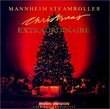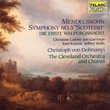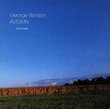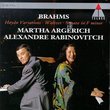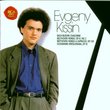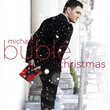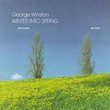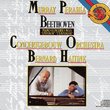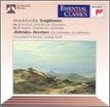| All Artists: Ralph Vaughan Williams, Herbert Howells, Matthew Best Title: Howells: Requiem; Vaughan Williams: Mass in G minor Members Wishing: 1 Total Copies: 0 Label: Hyperion UK Original Release Date: 1/1/2008 Re-Release Date: 3/11/2008 Album Type: Import Genre: Classical Styles: Opera & Classical Vocal, Chamber Music, Historical Periods, Classical (c.1770-1830), Early Music, Modern, 20th, & 21st Century Number of Discs: 1 SwapaCD Credits: 1 UPC: 034571152202 |
Search - Ralph Vaughan Williams, Herbert Howells, Matthew Best :: Howells: Requiem; Vaughan Williams: Mass in G minor
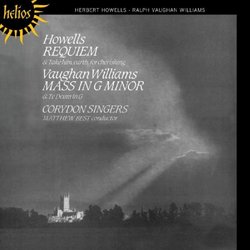 | Ralph Vaughan Williams, Herbert Howells, Matthew Best Howells: Requiem; Vaughan Williams: Mass in G minor Genre: Classical |
Larger Image |
CD DetailsSimilarly Requested CDs
|
CD ReviewsA voice teacher and early music fan George Peabody | Planet Earth | 07/03/2009 (5 out of 5 stars) "CAPTIVATING ENGLISH CHORAL MUSIC PERFORMED WITH SENSITIVITY AND SKILL BY THE CORYDON SINGERS AND FOUR OUTSTANDING SOLOISTS!
Ralph Vaughan William's (1872-1958) MASS IN G MINOR is dedicated to his close friend Gustav Holst and his Whitsuntide Singers. This group and Sir Richard Runciman Terry's Westminster Cathedral Choir, which specialised in 'early' choral music, were the inspiration for this gorgeous music. Terry gave the first liturgical performance of the work on March 12,1923. The G MINOR MASS is purposely spiritual in the manner of great Elizabethan liturgical music, employing clearly defined imitative entries for the voices, melodic shapes derived from plainchant, and modal harmonies. The composer, however, did not abandon the suggestions of English folksong and parallel harmonies typical of his style, in general. ( I don't think he could have done so,even if he tried; it's such a part all of his compositions.) The work includes four soloists SATB and mixed choir. Vaughan William composed his TE DEUM IN G MAJOR, for divided mixed choir and organ, for the enthronement of Dr. C.G.Lang as Archpishop of Canterbury Cathedral. It is a less flamboyant,less brilliant piece than the later 'Festival Te Deum',but it still expresses the rejoicing inherent in the occasion, and in many ways seems more heartfelt. Herbert Howells began composing his 1936 REQUIEM in response to the death of his nine year old son. Each of the movements, with texts taken from the Psalms and other scriptural and liturgical sources, uses rich late-Romantic harmonies and is suffused with gentleness, even serenity. In fact, the entire "Requiem" is highly emotional, especially the exquiste 2nd section (there are six in all) based on the 23rd Psalm. It is scored for mixed chorus and four soloists. A similar tonal language characterizes the motet TAKE HIM EARTH, FOR CHERISHING, written as a memorial for the John F.Kennedy,but it is somewhat more anguished and contains more harsh and severe harmonies. It was first performed in Washington D.C. in 1964, and is one of Howell's shorter pieces possessing a clear outline of sound, tunefulness(somewhat hidden much of the time) and arresting harmonies. Unlike the 'Requiem' which sustains a consistently tender but unsentimental mood, this work is sung freely and lets loose with impassioned outbursts that are powerful, but disciplined. The same can be said of Vaughan William's MASS and TE DEUM, works that have much more musical variety than the Howell's REQUIEM, but which, for all their loveliness don't quite reach the same depth of feeling. 'AN HOUR OF THE FINEST ENGLISH CHORAL MUSIC AND NOT TO BE MISSED' (The good CD Guide. A statement with which I heartily agree!. The performance by the Corydon Singers led by Matthew Best, brings to the music a tone that is pure, bright and warm. The voices of the soloists who are:Mary Seers(g minor mass), Janet Coxwell(Requiem)sopranos), Michael Chance (Countertenor), Philip Salmon (tenor) and Jonathan Best (bass), border on the divine. The manner in which they are alternated with the Corydon Singers in both the 'Requiem'and the "Mass" (especially the Mass),is truly masterful scoring by the composer. Of course, the pure sound of the countertenor woven throughout the Mass adds much to the ethereal quality of all the music. The good diction on the part of both soloists and chorus is much appreciated by me since there seems to be a tendency with some choral groups to 'chew up' the text. As the Good CD Guide quote mentioned previously, if you want an hour of absolutely divinely inspired music, you should enjoy this recording. " |

